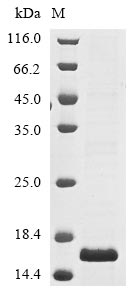Recombinant Klebsiella pneumoniae Undecaprenyl phosphate-alpha-4-amino-4-deoxy-L-arabinose arabinosyl transferase (arnT) is expressed in E. coli and includes an N-terminal 6xHis-tag for simplified purification. The product represents a partial protein spanning amino acids 429-551 and achieves greater than 90% purity as determined by SDS-PAGE. This research-use-only protein serves as a reliable tool for laboratory studies requiring high-quality reagents.
The arnT gene in Klebsiella pneumoniae encodes a protein that appears to play a crucial role in bacterial resistance mechanisms. Acting as an arabinosyl transferase, it modifies lipopolysaccharides—key components of the bacterial outer membrane. This modification may influence the bacterium's susceptibility to certain antibiotics, which makes arnT a significant focus in microbial resistance studies and a potentially valuable target for antibacterial research.
Potential Applications
Note: The applications listed below are based on what we know about this protein's biological functions, published research, and experience from experts in the field. However, we haven't fully tested all of these applications ourselves yet. We'd recommend running some preliminary tests first to make sure they work for your specific research goals.
The recombinant Klebsiella pneumoniae ArnT fragment (429–551aa), expressed in E. coli with an N-terminal 6xHis tag, represents a small C-terminal portion of a large integral membrane enzyme. ArnT is a membrane-bound arabinosyltransferase involved in lipid A modification, and its enzymatic activity depends on the full transmembrane and periplasmic architecture for correct folding and function.
Because this fragment was expressed in a bacterial cytoplasmic expression system (E. coli) without its transmembrane domains or membrane context, it is highly unlikely to fold correctly or retain any enzymatic or binding activity. Instead, it is expected to exist as a soluble or partially misfolded peptide representing a linear antigenic region. Thus, this protein is unsuitable for biochemical or enzymatic characterization, but highly appropriate for antibody generation and epitope mapping, as well as potentially for secondary structural or limited biophysical studies of the isolated domain.
1. Antibody Development and Validation
This ArnT fragment is well-suited for antibody production and screening. If the fragment is partially folded, antibodies raised against it may recognize native epitopes in the full-length ArnT protein. If misfolded, it still functions effectively as a source of linear epitopes for generating polyclonal or monoclonal antibodies, useful in Western blot, ELISA, and immunodetection assays.
The high purity (>90%) and His-tag simplify both immunization and antibody validation, ensuring minimal cross-reactivity and efficient purification.
2. Structural and Biophysical Analysis
This recombinant ArnT fragment may be useful for limited biophysical characterization, such as circular dichroism (CD) or dynamic light scattering (DLS), to assess secondary structure content and stability of the C-terminal region. If the fragment adopts partial folding, it could provide insights into local secondary structure motifs of ArnT. However, because it lacks membrane context and may aggregate in aqueous solution, high-resolution structure determination (X-ray, NMR, cryo-EM) is unlikely to succeed without extensive refolding optimization or fusion strategies.
Final Recommendation & Action Plan
The recombinant ArnT fragment expressed in E. coli is a non-functional C-terminal fragment of a membrane protein and thus cannot perform the enzymatic or physiological roles of native ArnT. However, its high purity and ease of purification make it ideal for antibody development, epitope mapping, and possibly secondary structure characterization. Focus this protein’s use on antibody generation and validation applications, where linear or partially folded epitopes suffice. Avoid kinetic, inhibitor, or protein-interaction studies, as the fragment lacks structural integrity and active-site residues. For functional enzymatic assays, use full-length ArnT reconstituted in a membrane-mimetic system (e.g., detergent micelles or nanodiscs).






